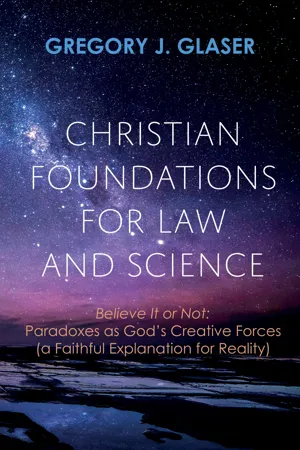
Christian Foundations for Law and Science
Believe It or Not: Paradoxes as God's Creative Forces (a Faithful Explanation for Reality)
- 164 pages
- English
- ePUB (mobile friendly)
- Available on iOS & Android
Christian Foundations for Law and Science
Believe It or Not: Paradoxes as God's Creative Forces (a Faithful Explanation for Reality)
About this book
In biblical Hebrew there is a word that means both "God" and "nothing." Paradoxically, what if God himself is simultaneously the All and the Nothing? Would this help explain why God is invincible and paradoxical?Paradoxes fill reality, with opposites routinely manifesting as the same thing at their extremes. Like the rugged earth, there is danger amidst opportunity here. While we study paradoxes to strengthen our connection with God, surprisingly in the process we learn about Satan's hypocrisies that crudely mimic paradoxes in our lives. The Bible teaches that Satan is a lying imitator, and a murderer.Why would God desire to teach us about God's own paradoxical creative power by comparison to Satan's destructive power of hypocrisy? Much of the Bible is devoted to answering this question by exposing hypocrisies in human culture and character. The Messiah particularly exposed the teachers of the law, scribes, and Pharisees, as hypocrites. When we get deeply self-honest, we know God is just, because we open our minds to possibilities that everything happens for a reason, where even the crucifixion of God's son creates healing ultimately.
Frequently asked questions
- Essential is ideal for learners and professionals who enjoy exploring a wide range of subjects. Access the Essential Library with 800,000+ trusted titles and best-sellers across business, personal growth, and the humanities. Includes unlimited reading time and Standard Read Aloud voice.
- Complete: Perfect for advanced learners and researchers needing full, unrestricted access. Unlock 1.4M+ books across hundreds of subjects, including academic and specialized titles. The Complete Plan also includes advanced features like Premium Read Aloud and Research Assistant.
Please note we cannot support devices running on iOS 13 and Android 7 or earlier. Learn more about using the app.
Information
Table of contents
- Title Page
- Introduction
- Chapter 1: The Grand Paradox
- Chapter 2: Anything in God Is Possible, Including Paradoxes
- Chapter 3: First Cause Paradox
- Chapter 4: Justice versus Multiverse
- Chapter 5: Paradoxes of Law and Free Will
- Chapter 6: Golden Ratio Paradoxes
- Chapter 7: Paradox of Why
- Conclusion
- Bibliography